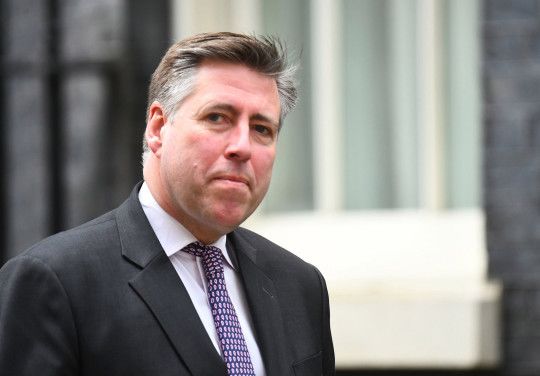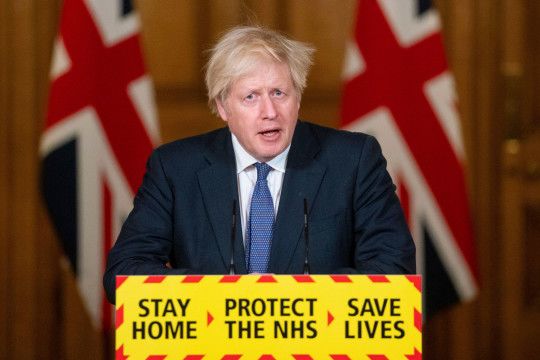Boris Johnson is set to approve controversial vaccine passports – but they will be subject to a ‘time limit’ of less than a year, reports claim.
The Prime Minister is expected to sign off a ‘vaccine certification’ system tomorrow, in a bid to breathe life into the economy.
Ministers are said to believe the scheme is the only way venues including pubs, theatres and stadiums can reopen to the public after the coronavirus pandemic.
But Mr Johnson is facing a backlash from 72 cross-party MPs who have joined forces to block the idea of a ‘Checkpoint Britain’, branded ‘divisive and discriminatory’.
He plans to placate Tory rebels by assuring them the passport scheme will be temporary.
Although no time limit has been agreed, Whitehall sources reportedly claim it will be no longer than a year.
‘It will be time limited and I think the duration of the scheme will be measured in months,’ one insider told the Daily Mail.
‘The party will not wear any longer.’
 Former Labour leader Jeremy Corbyn is one of the 72 cross-party MPs
against the vaccine passport scheme
Former Labour leader Jeremy Corbyn is one of the 72 cross-party MPs
against the vaccine passport scheme
 Sir Graham Brady, Chairman of the 1922 Committee of Tory backbenchers,
is among 40 Conservative MPs who have signed a pledge to block vaccine
passports
Sir Graham Brady, Chairman of the 1922 Committee of Tory backbenchers,
is among 40 Conservative MPs who have signed a pledge to block vaccine
passports
Labour’s Baroness Chakrabarti warned the certificates would create a ‘Checkpoint Britain’.
She told BBC Radio 4’s Today show: ‘It’s one thing to have a passport to travel internationally, that is a privilege, even a luxury, but participating in local community life is a fundamental right.’
The pledge against the scheme has been signed by former Labour leader Jeremy Corbyn and Shadow Chancellor John McDonnell, together with former Tory leader Sir Iain Duncan Smith and ex-Lib Dem leader, Tim Farron.
Senior Tory MP, Sir Graham Brady, chair of the influential 1922 Committee, is thought to be among 40 Conservative MPs who have also signed the document.
‘Covid-status certification would be divisive and discriminatory,’ Sir Graham said.
‘With high levels of vaccination protecting the vulnerable and making transmission less likely, we should aim to return to normal life, not to put permanent restrictions in place.’
It comes as business leaders warned the vaccine passport scheme could ‘really scupper’ recovery efforts by hospitality venues.
 Those opposed to the passport scheme say it will discriminate against
those who have not had the coronavirus vaccine
Those opposed to the passport scheme say it will discriminate against
those who have not had the coronavirus vaccine
Emma McClarkin, chief executive of the British Beer and Pub Association, said the passports would be an ‘additional burden’ to landlords ‘desperate to get back open again’.
‘We will play our part in test and trace but the additional burden of the vaccine passport could really, really scupper things,’ she said.
‘It is a difficult process for us to implement in venues and yet today we have not had a consultation with the Government about how we would do this in pubs.’
But Mr Johnson suggested a certificate could provide ‘maximum confidence’ to both businesses and customers as lockdown measures relax.
During a visit to Middlesbrough on Thursday he said there were ‘three things’ – whether someone has immunity, if they have been vaccinated or if they have had a recent test – that ‘working together will be useful as we go forward’.
Mr Johnson also revealed how there would ‘definitely’ be a role for vaccine passports in respect of international travel.
It comes as the Government’s Global Taskforce is due to unveil plans for travel on April 12 – the earliest non-essential shops will open as part of Mr Johnson’s roadmap out of lockdown.
Capacities at sporting events will also be determined by the success of a number of pilot events taking place from mid-April.
Pilots are being planned for events including the FA Cup final in May, according to the Daily Telegraph.
The Government insisted no final decisions have been taken on whether Covid-status certification could play a role in reopening the economy.
A spokeswoman said: ‘The review is considering a range of issues, including the ethical, equalities, privacy, legal and operational aspects, and what limits, if any, should be placed on organisations using certification.’
















 Mr
Mr